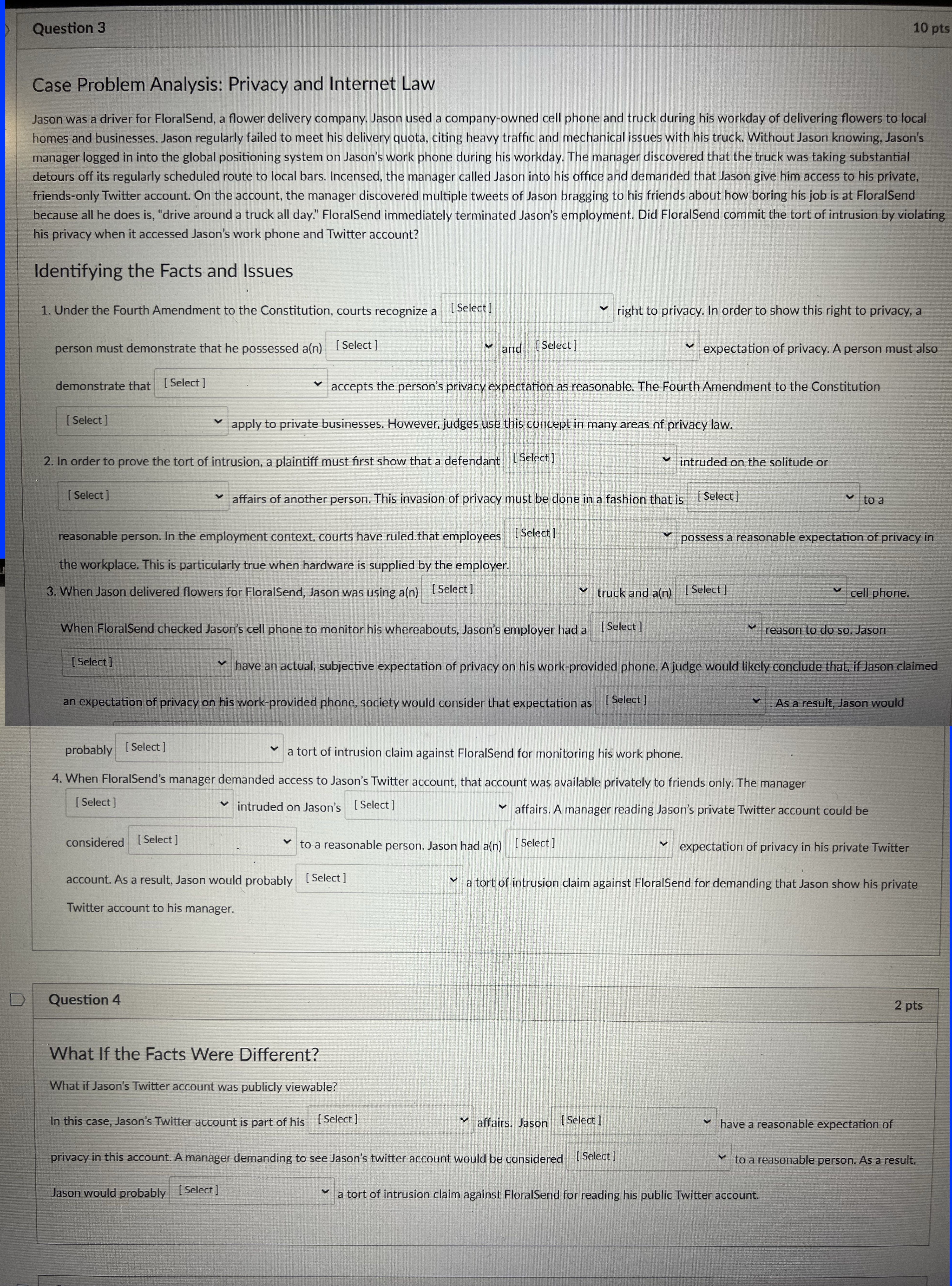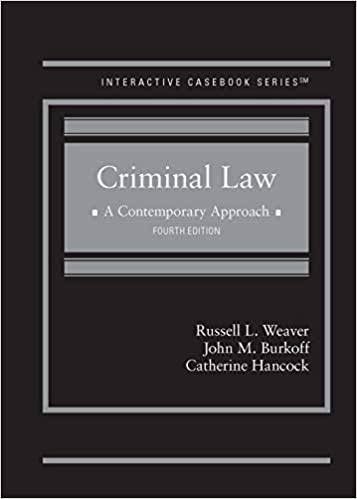Multiple choice options:Question 3:Part 1. a. Reasonable or limitedb. Theoretical or actualc. Objective or subjectived. His lawyer, society, or the courte. does or does notPart 2. a. Negligently or intentionallyb. Public or private c. Offensive, annoying, or a nuisanced. do or do notPart 3 a. Employee or employerb. Personally owned or employer ownedc. Unjustified or justified d. Did or did note. Reasonable, partially reasonable, unreasonablef. Win or losePart 4 a. Intentionally, recklessly, negligentlyb. Private or publicc. Offensive or not offensived. Reasonable or unreasonablee. Win or loseQuestion 4:a. Public or private b. does not or doesc. Not offensive or offensive d. Lose or win
Question 3 10 pts Case Problem Analysis: Privacy and Internet Law Jason was a driver for FloralSend, a flower delivery company. Jason used a company-owned cell phone and truck during his workday of delivering flowers to local homes and businesses. Jason regularly failed to meet his delivery quota, citing heavy traffic and mechanical issues with his truck. Without Jason knowing, Jason's manager logged in into the global positioning system on Jason's work phone during his workday. The manager discovered that the truck was taking substantial detours off its regularly scheduled route to local bars. Incensed, the manager called Jason into his office and demanded that Jason give him access to his private, friends-only Twitter account. On the account, the manager discovered multiple tweets of Jason bragging to his friends about how boring his job is at FloralSend because all he does is, "drive around a truck all day." FloralSend immediately terminated Jason's employment. Did FloralSend commit the tort of intrusion by violating his privacy when it accessed Jason's work phone and Twitter account? Identifying the Facts and Issues 1. Under the Fourth Amendment to the Constitution, courts recognize a [Select ] right to privacy. In order to show this right to privacy, a person must demonstrate that he possessed a(n) [ Select ] and [Select ] expectation of privacy. A person must also demonstrate that [ Select ] accepts the person's privacy expectation as reasonable. The Fourth Amendment to the Constitution [ Select ] apply to private businesses. However, judges use this concept in many areas of privacy law. 2. In order to prove the tort of intrusion, a plaintiff must first show that a defendant [ Select ] intruded on the solitude or [ Select ] affairs of another person. This invasion of privacy must be done in a fashion that is [ Select ] to a reasonable person. In the employment context, courts have ruled. that employees [ Select ] possess a reasonable expectation of privacy in the workplace. This is particularly true when hardware is supplied by the employer. 3. When Jason delivered flowers for FloralSend, Jason was using a(n) [ Select ] truck and a(n) [ Select ] cell phone. When FloralSend checked Jason's cell phone to monitor his whereabouts, Jason's employer had a [ Select ] reason to do so. Jason [ Select ] have an actual, subjective expectation of privacy on his work-provided phone. A judge would likely conclude that, if Jason claimed an expectation of privacy on his work-provided phone, society would consider that expectation as [Select ] . As a result, Jason would probably [ Select ] a tort of intrusion claim against FloralSend for monitoring his work phone. 4. When FloralSend's manager demanded access to Jason's Twitter account, that account was available privately to friends only. The manager [ Select ] intruded on Jason's [ Select ] affairs. A manager reading Jason's private Twitter account could be considered [ Select ] to a reasonable person. Jason had a(n) [Select ] expectation of privacy in his private Twitter account. As a result, Jason would probably [ Select ] a tort of intrusion claim against FloralSend for demanding that Jason show his private Twitter account to his manager. D Question 4 2 pts What If the Facts Were Different? What if Jason's Twitter account was publicly viewable? In this case, Jason's Twitter account is part of his [ Select ] affairs. Jason [ Select ] have a reasonable expectation of privacy in this account. A manager demanding to see Jason's twitter account would be considered [ Select ] to a reasonable person. As a result, Jason would probably [ Select ] a tort of intrusion claim against FloralSend for reading his public Twitter account







